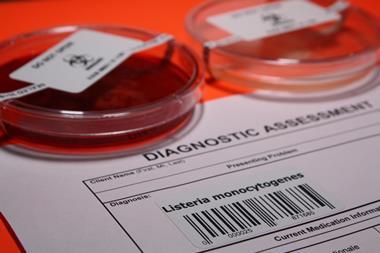As an inquest determines Celia Marsh’s death was caused by contaminated coconut yoghurt, gaps remain in the UK’s regulatory system
On 27 December 2017, Celia Marsh travelled to Bath with her husband and children for a shopping trip in the Christmas sales. At lunchtime, they stopped by a Pret a Manger. Being highly allergic to dairy, Celia opted for a vegan flatbread. But the coconut yoghurt it contained was contaminated. She died a few hours later.
Marsh’s case is tragic but not unusual. In the UK alone, 152 people died from food-induced anaphylaxis in the past 20 years, according to BMJ research last year, and yet every one of them is arguably preventable. In countries like Finland, the number is zero.
The British system has improved in recent years, most notably due to ‘Natasha’s Law’, which marks its one-year anniversary this weekend and closed a major loophole by forcing all food shops to display allergen labelling for every product made in store.
But as a coroner overseeing Marsh’s inquest suggested last week, there is still a long way to go if more allergen-related deaths are to be prevented in future. “Allergy sufferers should not have to gamble with their lives every time they eat outside the house,” says Gareth Gower, Marsh’s brother. “Celia’s death should be a driver for change.”
Obligatory testing
The flatbread that killed Marsh was labelled as ‘vegan’. It was meant to be dairy-free. Still, neither Planet Coconut who made the flatbread’s coconut yoghurt, nor Pret who sold it, did any testing to determine whether this was justified.
“[For] dairy-free, ‘free-from’ claims,” said coroner Maria Voisin in her closing remarks last week, “should there be a system of obligatory testing for all ingredients in a supply chain when making such claims?”
Such testing is already available. The ‘VITAL’ programme for allergen testing used widely in Australia, for example, is a voluntary scheme that deems a product is appropriate for a ‘may contain’ label if it is unlikely to elicit an objective reaction in 99% of the allergic population.
Yet it’s not perfect. Nigel Payne, a public analyst, told Marsh’s inquest that VITAL was not developed to address the appropriateness of a free-from claim, largely because measuring minute amounts of milk protein in food with any certainty is very difficult.
But improvements may be coming. Codex (the organisation that develops global food standards) is expected to publish a review of thresholds in the coming months, which the FSA “will then review in full”, its director of policy, Rebecca Sudworth, confirms.
When will it stop?
Natasha Ednan-Laperouse
- Died in 2016, aged 15, after eating a baguette containing sesame in Pret a Manger
Owen Carey
- Died in 2017, aged 18, after eating grilled chicken at Byron containing dairy.
Celia Marsh
- Died in 2017, aged 42, after eating a ‘vegan’ Pret a Manger wrap containing traces of milk.
Shanté Turay-Thomas
- Died in 2018, aged 18, after eating hazelnuts.
Ruben Bousquet
- Died in 2019, aged 14, after eating popcorn contaminated with milk at a cinema.
James Atkinson
- Died in 2020, aged 23 after ordering a takeaway pizza via Deliveroo in Newcastle. He had a known peanut allergy.
With obligatory testing based on sound science, supermarkets and manufacturers could establish good knowledge of the risk attached to their products. Allergen sufferers, meanwhile, could eat with the confidence that physical testing had been done and so eat with the security that their health, or even life, should not be danger.
Without it, however, food companies are typically left to turn to precautionary allergen labelling such as ‘may contain’ in order to highlight a risk of cross-contamination but often without the testing to go with it. While set in good faith, many, including Marsh’s family, are frustrated at this “vague labelling” that leaves allergen sufferers unable to determine the risk they face.
Given the stakes, many senior food figures are thought to be keen on change. “It wouldn’t be onerous on industry,” says one senior industry source. “And I’m not detecting any real resistance to it. It’d be like saying, in an ideal world, you’d have no listeria, no e.coli, no salmonella. It just needs the will of somebody in the regulatory world to get on top of it.”
Call for action
But even with such testing in place, incidents will still occur. It’s what happens then that experts say must form the second stage of reform.
Go to a hospital with food poisoning and the doctor has a statutory duty to notify a central register. It means that tracking cases, identifying the potential source of the poisoning, and recalling harmful products, is all made significantly easier. In some cases, it saves lives.
But despite numerous calls, anaphylaxis requires no such system to record severe or fatal reactions to food allergens. Coroner Voisin suggested there should be last week. So did the coroner’s report after the death of Ruben Bousquet in 2019. So did the coroner’s report after the death of Owen Carey in 2017. So did the coroner’s report after the death of Natasha Ednan-Laperouse in 2016. “We call for urgent action by the FSA to act on the coroner’s recommendation to introduce a national reporting system for these types of incidents,” said Kate Thompson, director Wales at The Chartered Institute of Environmental Health in 2021 after Bousquet’s inquest.
It is argued that with an official body monitoring this information it could say, for example, ‘there seem to be three cases of anaphylaxis around Leicester. All of them have eaten food from a sandwich manufacturer making a free-from claim. We should go and have a look.’
Certain registers do exist. In 2021, the FSA provided one-off funding to the UK Fatal Anaphylaxis Registry “to help us better understand the prevalence of anaphylaxis-related deaths,” says Sudworth. The British Society for Allergy & Clinical Immunology has also established a national reporting platform for allergic reactions.
However, both fall short of the impact a national register would have if anaphylaxis was made a notifiable disease, says Stephen Holgate, a world-leading allergy professor and trustee of the Natasha Allergy Research Foundation. He argues the absence of better protections – including a national register – is primarily a failure of attitude. “The UK hasn’t taken this area seriously enough. That’s the blame.””
Death certificates, for example, still typically report asthma as the cause rather than food-induced anaphylaxis. And a lack of research means scientists are still largely unaware why such extreme cases occur. It means “almost every time someone dies, there are no learnings,” says Nadim Ednan-Laperouse, father of Natasha.
Experts like Holgate insist there is nothing complex about the changes required. In the short term, obligatory testing and a new national register could help cut the number of people exposed to allergens and therefore placed at risk. Longer-term, the goal is for the risk of food-induced anaphylaxis to be eliminated through better education and exposing young children to mild allergens at an early age.
“All of this can be prevented,” Holgate says. “The UK has some of the worst statistics in Europe and we’re not talking about 95-year-olds here. The majority are fairly young people and children. We’re talking about people dying before they’ve had a life.”




















No comments yet